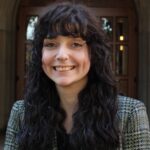Office of Postdoctoral Affairs Newsletter Features Helen Makhdoumian
 This post by Helen Makhdoumian (CHPP Fellow) is from the Office of Postdoctoral Affairs March 6, 2024 newsletter
This post by Helen Makhdoumian (CHPP Fellow) is from the Office of Postdoctoral Affairs March 6, 2024 newsletter
Walk by the Robert Penn Warren Humanities Center (RPW) on a sunny afternoon, and you’ll likely see a group of people eating at one of the tables outside and having a lively conversation. Odds are good it’ll be a group of Collaborative Humanities Postdoctoral Program Fellows who have found each other for an impromptu lunch. There are 13 CHPP Fellows, soon to grow with another cohort. We hold PhDs in different humanities disciplines: History, English, and Art History to name a few.
At Vanderbilt, each of us is affiliated with either a department or center. English is my home department. I say that “C” in CHPP should really stand for “Club” since many of us end up at the same events on campus. The best part is when we inadvertently sit next to each other and introduce ourselves: “I am also a CHPP Fellow, but in the Department of…” One of us might then say, “And rounding out the CHPP group, I’m…” That is until another one of us arrives. And so the process of identification by relation continues. These and innumerable other moments with fellow CHPP Fellows have made me smile.
You’ll also hear us identify with one of three research clusters: Global, Environmental, or Urban Humanities. I am part of the Global Humanities research cluster. While each group member works in a different discipline and on different topics, we come together to discuss the implications of the global movements of people, goods, and ideas as well as issues of dislocation, belonging, and citizenship. This year, the Global Humanities research cluster is organizing events around the theme “A World Without Borders.” When we think about transcending borders, we mean imposed geopolitical borders and perceived borders between knowledge making and sharing. Keep your eyes open for our big event in April. A panel of artists, scholars, and community members will discuss what rupturing, pushing against, and navigating within and across borders means to them.
My own research? My book manuscript is my main project. I bring together Armenia, Palestine, and Native North America in a sustained scholarly frame. To that end, I examine how fiction and nonfiction writers from each of these groups reflect on memories of displacement, dispossession, and violence. In doing so, I open an expansive discussion of the global politics of indigeneity and diaspora that, following the authors, offers insight into the iterative experience of trauma, from living through ongoing settler colonial violence, to ethnic civil wars, or both. I make my interventions as a literary studies scholar.
Histories of mass atrocities such as indigenous genocide in the United States, the Armenian genocide of 1915, or the Nakba of 1948 do the important work of revealing the devastating facts of who did what, when, and where. My work shows how the dispossessed and removed find a way to speak after all. Put differently, it is about how Armenian, Palestinian, American Indian, and First Nations authors get the afterword through their literary production. Authors I study do not occupy the position of survivor in their communities’ respective events of territorial removal but that of the inheritor of memories and observer of the ripples, reverberations, and remains of history.
I treat them as theorists who write from that latter position of witnessing. To read Armenian, Palestinian, American Indian, and First Nations authors together is not simply to reflect on how the United States has shaped these memories, but moreover to attend to an even vaster transnational frame, including France, Lebanon, Kuwait, Jordan, Ethiopia, and Uganda, among other locations. American literature, then, is worlded through these authors’ words on removal memory.
I’m also enjoying getting to know students. Currently, I am teaching a first-year writing seminar, “The Repair Work of Righting and Writing.” Next Fall, I’ll teach a Native American literature course on the contemporary multi-narrative novel in the United States and Canada. Next Spring, I’ll teach an Anglophone literature class on Middle Eastern and North African authors who use the themes of curses, fortunes, and destinies to address weightier issues.
Helen Makhdoumian is a postdoc in Collaborative Humanities Postdoctoral Program (CHPP) at Vanderbilt University. Helen is a literary studies scholar who takes up a relational approach to theorize the legacies of collective violence in the Middle East and in North America. In so doing, she expands upon discourses in trauma, memory, and genocide studies, as well as diaspora, transnational, and migration studies. Her book project, Nested Memory and the After-Words of Removal, focuses on multigenerational transmissions of memory in the face of the recursivity of collective trauma. It features contemporary texts by Armenian American, Palestinian American, American Indian, and First Nations authors. Helen enjoys getting to know the students she teaches and having the opportunity to help others expand their breadth of knowledge on world issues.